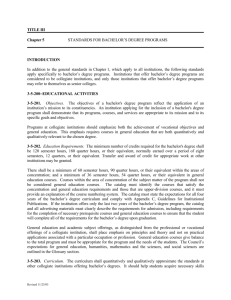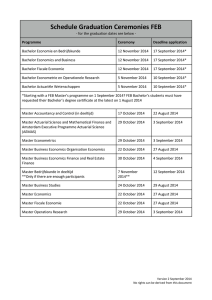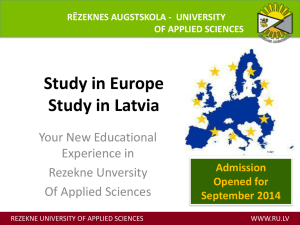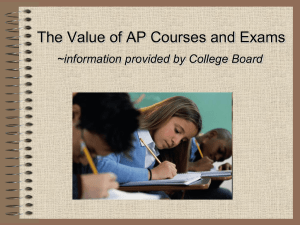Rezekne Higher Education Institution
advertisement
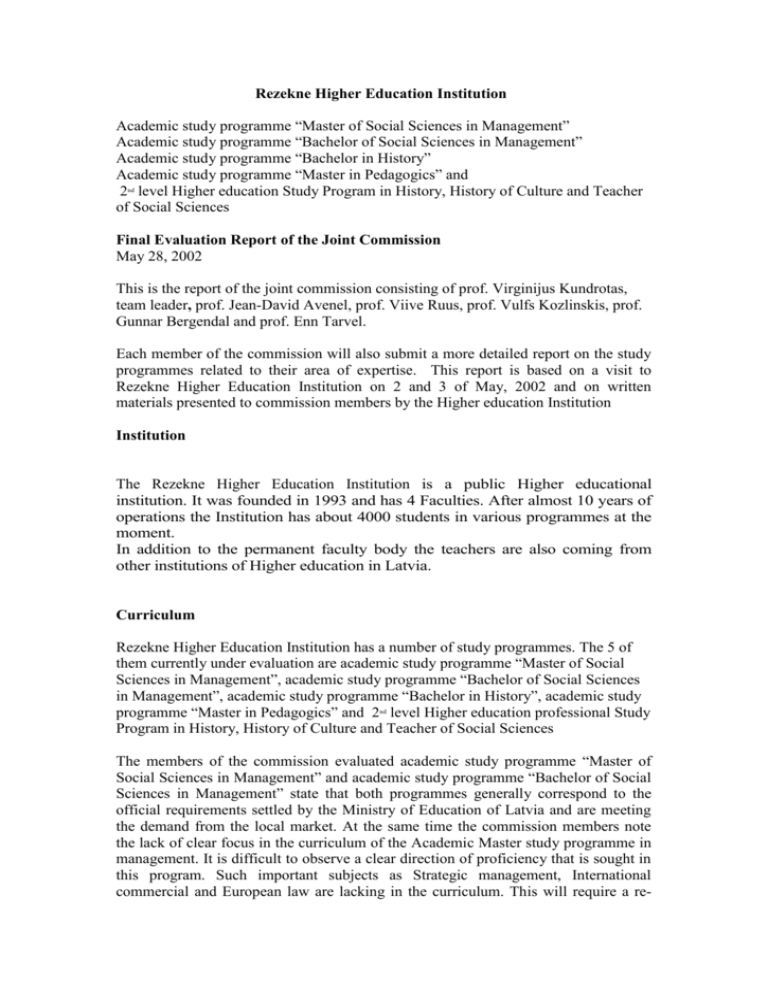
Rezekne Higher Education Institution Academic study programme “Master of Social Sciences in Management” Academic study programme “Bachelor of Social Sciences in Management” Academic study programme “Bachelor in History” Academic study programme “Master in Pedagogics” and 2nd level Higher education Study Program in History, History of Culture and Teacher of Social Sciences Final Evaluation Report of the Joint Commission May 28, 2002 This is the report of the joint commission consisting of prof. Virginijus Kundrotas, team leader, prof. Jean-David Avenel, prof. Viive Ruus, prof. Vulfs Kozlinskis, prof. Gunnar Bergendal and prof. Enn Tarvel. Each member of the commission will also submit a more detailed report on the study programmes related to their area of expertise. This report is based on a visit to Rezekne Higher Education Institution on 2 and 3 of May, 2002 and on written materials presented to commission members by the Higher education Institution Institution The Rezekne Higher Education Institution is a public Higher educational institution. It was founded in 1993 and has 4 Faculties. After almost 10 years of operations the Institution has about 4000 students in various programmes at the moment. In addition to the permanent faculty body the teachers are also coming from other institutions of Higher education in Latvia. Curriculum Rezekne Higher Education Institution has a number of study programmes. The 5 of them currently under evaluation are academic study programme “Master of Social Sciences in Management”, academic study programme “Bachelor of Social Sciences in Management”, academic study programme “Bachelor in History”, academic study programme “Master in Pedagogics” and 2nd level Higher education professional Study Program in History, History of Culture and Teacher of Social Sciences The members of the commission evaluated academic study programme “Master of Social Sciences in Management” and academic study programme “Bachelor of Social Sciences in Management” state that both programmes generally correspond to the official requirements settled by the Ministry of Education of Latvia and are meeting the demand from the local market. At the same time the commission members note the lack of clear focus in the curriculum of the Academic Master study programme in management. It is difficult to observe a clear direction of proficiency that is sought in this program. Such important subjects as Strategic management, International commercial and European law are lacking in the curriculum. This will require a re- evaluation of the course selection. The members of the commission are also noted that the research methods part in Master theses should be strengthen. The quality of Bachelor in Management theses also should be strengthen. The members of the commission evaluated the academic study programme “Bachelor in History” admitted the good scientific and pedagogical level of the programme. The strongest side of this programme is the remarkable use of research, expressed in the theses demonstrated. The more detailed comments will be presented in their individual reports. The members of the commission evaluated the academic study programme “Master in Pedagogics” note the following. The “Master in Pedagogics” seems to be apar with other similar programmes in Latvia. Its strength is broad aims related to the needs of the region and the country. This Master's programme prepares not only for future research in an academic context but also - and perhaps essentially for work in key positions in society, where meeting new challenges and seeing the vital points of a situation are important aspects of the work. The members of the commission got the impression that the programme would be well served by a further emphasis on qualitative methods of research, and also that the quantitative methods could be more sophisticated. However, the important thing is that the research should not be determined by the current methods, but that suitable methods be developed for each issue at hand. The library is for this programme not sufficient in itself and should be consolidated continuously. However, the cooperation with other libraries, nationally and internationally, compensates to a large extent for such shortcomings. The 2nd level Higher education professional Study Program in History, History of Culture and Teacher of Social Sciences reflects changes in the comprehensive school curriculum. The programme is a supplementary programme for students already having completed their first level studies. It may be considered a transitory programme for remedying the lack of teachers in the new social science subject of school. The members of the commission see that in a longer perspective of time a comprehensive programme of teachers of History and the Social Sciences should be developed. In the present context of evaluation the commission noted that the subject "social sciences" at school is not defined in the self-evaluation report. From the discussions it was learned that ethics and health care are included in this subject at school. In contrast, at universities the social sciences make up an internationally defined domain of disciplines, with certain traditions of thinking. Another problem was that the self-evaluation report did not provide a comprehensive view of the contents of the first level higher education of the teachers involved - a first level that has (in many cases) been of 4 years' duration, but will, in the future, be a 3 1/2-year study. The proposed rather uniform second level program may result in repetitions for most categories of students - an inefficient use of time. Nevertheless, this programme may be the simplest way of satisfying the needs for new teacher qualifications according to the new needs of the school, but there are no arguments in the self-evaluation report showing that this is the case. Learning Facilities The learning facilities of Rezekne Higher Education Institution are located in the center of Rezekne. The classroom facilities are good enough and supportive of the learning process. All the classrooms are equipped with overhead projectors. The Institution also has sufficient computer facilities (65 PCs) complete with INTERNET access, modest library, and sport facilities for the students and faculty. Because Rezekne Higher Education Institution is a young Institution, the library also lacks a wider selection of international books, journals and magazines in the fields of economics and business. Especially it should be addressed to the basic textbooks for the Master of Management studies. The Faculty’s expansion plans, however, include expanding in this area. As a whole, the premises are good and appear to provide a satisfactory space for current needs and realistic development of institution. Classroom space is enough and adequate for the learning process. Students and Faculty The commission had a chance to have discussion with various groups of students, representing various study years and programmes, they are studying in. They were open and generous in conversation. Despite the modesty in their English knowledge, they were able to express clearly their position concerning the various issues in study process and Institution’s life in general. The students were very satisfied with their studies at the Rezekne Higher Education Institution, good and friendly atmosphere here, and the professional emphasis. The computer resources were considered sufficient. However, some students mentioned that the library could be developed better. The commission had a chance to talk with a number of employers, business partners and graduates of the Institution. The employers were satisfied by the good knowledge of graduates from the programmes under the evaluation process and also noted the intelligence, quick orientation, creativity and responsibility of their, which appeared during the work practice. The graduates expressed their satisfaction concerning the programmes they graduated from. The commission also expresses gratitude to the staff and faculty of Rezekne Higher Education Institution. They were extremely hospitable, friendly and helpful. The faculty comprises full time and part time lecturers. This is a combination of young eager teachers, many of whom are doctoral students, and of the mature and experienced teachers. The commission pays the attention that the middle generation of experienced faculty should be expanded in addition to the mature and the very young ones in order to serve as teachers for the young colleagues. At the same time, the young generation of faculty has a lot of potential to grow and it makes possible to believe in successful further development of the Institution. The Rezekne Higher Education Institution has agreements of academic cooperation with institutions in foreign counties, like Greece, Norway, France, Belgium, Lithuania and others. The faculty of the Institution also are involved in writing teaching notes and textbooks. Final Recommendations Here we make five recommendations: First, the commission recommends unconditional (six years) accreditation of the “Bachelor of Social Sciences in Management” academic programme as a programmes meeting the market demand and generally meeting the quality standards of the undergraduate academic programmes. However, the suggestions mentioned in the report above should be taken into consideration. Second, the commission recommends conditional (two year) accreditation of the academic study programme “Master of Social Sciences in Management”. The commission believes that this time period will be sufficient enough to make the changes suggested, such as curricullum corrections, library (first of all-English texts) development and faculty development. Third, the commission recommends unconditional (6 year) accreditation of the academic study programme “Bachelor in History” and academic study programme “Master in Pedagogics”, taking into consideration that remarkable progress in development of those programmes took place during the recent years. Fourth, the commission recommends 6 year accreditation of the 2nd level Higher education professional Study Program in History, History of Culture and Teacher of Social Sciences with the restrictions, which will be underlined on a later stage in joint report as well as in individual reports of members of the commission. Only after the implementation of those suggestions this recommendation will apply. Fifth, the commission is considering Rezekne Higher Education Institution as a very important educational institution in Latgala region having a good potential to develop further and serve as a positive example of institution taking care of regional challenges. After the implementation of changes in the Master of Management programme, all the programmes mentioned would may also serve as examples of good quality programmes nationally and internationally. On behalf of the commission: Prof. Virginijus Kundrotas, Lithuania May 28, 2002 The commission: Prof. Virginijus Kundrotas, Lithuania Prof. Jean-David Avenel, France Prof. Viive Ruus, Estonia Prof. Vulfs Kozlinskis, Latvia Prof. Gunnar Bergendal, Sweden Prof. Enn Tarvel, Estonia Individual Evaluation Report on the Academic study programme “Master of Social Sciences in Management” Academic study programme “Bachelor of Social Sciences in Management” Academic study programme “Bachelor in History” Academic study programme “Master in Pedagogics” and 2nd level Higher education Study Program in History, History of Culture and Teacher of Social Sciences at the Rezekne Higher Education Institution May 28, 2002 This is the report of dr. Virginijus Kundrotas. This report is based on a visit to the Rezekne Higher Education Institution on May 2 and 3 of 2002 and on written material presented to the expert by Rezekne’s Higher Education Institution Curriculum Rezekne Higher Education Institution has a number of study programmes. The 5 of them currently under evaluation are academic study programme “Master of Social Sciences in Management”, academic study programme “Bachelor of Social Sciences in Management”, academic study programme “Bachelor in History”, academic study programme “Master in Pedagogics” and 2nd level Higher education professional Study Program in History, History of Culture and Teacher of Social Sciences After the evaluation of the curriculum of both Management programmes I agree with the opinion of joint commission that academic study programme “Master of Social Sciences in Management” and academic study programme “Bachelor of Social Sciences in Management” generally correspond to the official requirements settled by the Ministry of Education of Latvia and are meeting the demand from the local market. At the same time the lack of clear focus in the curriculum of the Academic Master study programme in management was noticed. It is difficult to observe a clear direction of proficiency that is sought in this program. Such important subjects as Strategic management, International commercial and European law are lacking in the curriculum. This will require a re-evaluation of the course selection. The research methods part in Master theses should be strengthen as well as the quality of Bachelor in Management theses also should be strengthen. It is also clear weakness in the quality control system. It was observed that in a substantial part of courses students are evaluated by oral exams, rather than written exams, which are known to allow for greater quality control. The reasons provided cannot serve as ssubstantial explanation. For the evaluation of academic study programme “Bachelor in History”, academic study programme “Master in Pedagogics” and 2nd level Higher education Study Program in History, History of Culture and Teacher of Social Sciences are fully relay on the opinion of the relevant experts of those programmes. Learning Facilities The learning facilities of Rezekne Higher Education Institution are located in the center of Rezekne. The classroom facilities are good enough and supportive of the learning process. All the classrooms are equipped with overhead projectors. The Institution also has sufficient computer facilities (65 PCs) complete with INTERNET access, modest library, and sport facilities for the students and faculty. Because Rezekne Higher Education Institution is a young Institution, the library also lacks a wider selection of international books, journals and magazines in the fields of economics and business. Especially it should be addressed to the basic textbooks for the Master of Management studies. The Faculty’s expansion plans, however, include expanding in this area. As a whole, the premises are good and appear to provide a satisfactory space for current needs and realistic development of institution. Classroom space is enough and adequate for the learning process. Personnel After the discussion with various groups of students, representing various study years and programmes, they are studying in, I may do the following statements. The students are very satisfied with their studies at the Rezekne Higher Education Institution, good and friendly atmosphere here, and the professional emphasis. The computer resources were considered sufficient. However, some students mentioned that the library could be developed better. The students were open and generous in conversation. Despite the modesty in their English knowledge, they were able to express clearly their position concerning the various issues in study process and Institution’s life in general. After the meeting with a number of employers, business partners and graduates of the Institution I can make a conclusion that the employers are satisfied by the good knowledge of graduates from the programmes under the evaluation process and also noted the intelligence, quick orientation, creativity and responsibility of their, which appeared during the work practice. The graduates expressed their satisfaction concerning the programmes they graduated from. The faculty at Rezekne Higher education Institution comprises full time and part time lecturers. This is a combination of young eager teachers, many of whom are doctoral students, and of the mature and experienced teachers. The attention should be paid that the middle generation of experienced faculty should be expanded in addition to the mature and the very young ones in order to serve as teachers for the young colleagues. At the same time, the young generation of faculty has a lot of potential to grow and it makes possible to believe in successful further development of the Institution. The Rezekne Higher Education Institution has agreements of academic cooperation with institutions in foreign counties, like Greece, Norway, France, Belgium, Lithuania and others. The faculty of the Institution also are involved in writing teaching notes and textbooks. Final Recommendations I would like to expresses gratitude to the staff and faculty of Rezekne Higher Education Institution for their hospitality, professional help and efficiency during the visit. I fully support the conclusions of the expert commission and would like to make the following individual recommendations: First, I recommend unconditional (six years) accreditation of the “Bachelor of Social Sciences in Management” academic programme as a programmes meeting the market demand and generally meeting the quality standards of the undergraduate academic programmes. However, the suggestions mentioned in the report above should be taken into consideration. Second, I support the opinion of the commission to recommend conditional (two year) accreditation of the academic study programme “Master of Social Sciences in Management”. The commission believes that this time period will be sufficient enough to make the changes suggested, such as curricullum corrections, library (first of all-English texts) development and faculty development. Third, I agree that unconditional (6 year) accreditation of the academic study programme “Bachelor in History” and academic study programme “Master in Pedagogics” should be recommended, taking into consideration that remarkable progress in development of those programmes took place during the recent years. . Fourth, I recommend in a line with the commission recommendation to give 6 year accreditation of the 2nd level Higher education professional Study Program in History, History of Culture and Teacher of Social Sciences with the restrictions, which were underlined in joint report as well as in individual reports of members of the commission. Only after the implementation of those suggestions this recommendation will apply. Dr.Virginijus Kundrotas, International School of Management, Kaunas,Lithuania Individual Report of the member of Joint Evaluation Commission at Rezekne Higher Educational Institution on the Academic Study Programme "Bachelor in History" of the Humanities and Law Faculty and on the "Second level Higher Professional Education History, History of Culture and Social Sciences Teacher Study Programme" of the Humanities and Law Faculty Enn Tarvel prof.emer., dr.sc.hist. Trummi poik 5A-30 Tallinn 12616, Estonia tel. 372-6726 189 e-mail: tarvel@hot.ee I am loyal to the Preliminary Evaluation Report of the Joint Evaluation Commission and to the common decision to recommend: two years accreditation of the academic study programme "Master of Social Sciences in Management", six years accreditation of the academic study programme "Bachelor of Social Sciences in Management", six years accreditation of the academic study programme "Bachelor in History", six years accreditation of the academic study programme "Master in Pedagogics", six years accreditation of the Second level Higher professional education history, history of culture and social sciences teacher study programme. I have to add as follows. As an historian I have taken up a position only in the evaluation on the academic study programme "Bachelor in History" and on the "Second level History, History of Culture and Social Sciences Teacher Study Programme". The development of regional higher education is an important matter for state regional policy. Rezekne Higher Educational Institution is a good case of this development: regional, local subjects and material is effectively used in student research. In carrying into effect the Bachelor in History programme the research aspect is distinguished. Some of the Bachelor theses (about mass deportation, about farm buildings of a parish a.o.) are on a really high level. It demonstrates the unity of theory and practice (mentioned p.5 of the Programme). With the presentation of the Bachelor thesis the student earns 10 credits in A part. The role of the Bachelor thesis seems to be greater, 10 credits (from the sum 1 1 9 - 1 2 5 credits) undervalues this. (Cfr. the 2nd level qualification paper with the same amount of 10 credits.) Unfortunately, we have not had the chance to participate in any of the lectures or seminars. Thus we cannot estimate the share of real independent work by the side of contact lessons. It is so that the seminars have to be student's independent work not some minilectures or consultations of the lecturer. Among compulsory selective lecture courses and elective courses are some of them useful for only general enlargement of mind (about remote continents a.o.), the students in conversation with them have most highly estimated lectures upbuilt on principle, with problems (they have highly valued teaching in politology). It is commendable that beside English other relevant languages for Latvian and regional studies (German, Latin, Polish, Lithuanian) are taught. Remarkable that not Russian (perhaps the practical knowledge of Russian is nowadays yet sufficient in Eastern Latvia?). " The Library gives all in present situation possible support to the programme and independent student research work. It is in some degree provided even with the latest international literature. In the evaluation of the "2nd level higher professional education history, history of culture and social sciences teacher study programme" I have been an outsider by the side of professional educationalists because the programme is educational, didactical one, both in theoretical and practical part. In so far as the Programme has points of contact with historical sciences (in preparation of teachers in history or history of culture), I have no expostulations. I have seen qualification theses and had a chance to talk with the students. The content and balance of social sciences and their relation to the Programme as a whole is not clear for me. Tallinn, May 19th 2002 Individuālais ziņojums par Rēzeknes augstskolas sociālo zinātņu bakalaura un maģistra studiju programmām Vadības zinātnē Individuālais ziņojums sagatavots balstoties uz akreditācijai iesniegto materiālu studijām un Rēzeknes augstskolas apmeklējuma (03.-04.maijs, 2002) rezultātiem. Rēzeknes augstskolas vizītes programmas svarīgākie punkti bija: lekciju un semināru apmeklējums; sarunas ar studentiem; tikšanās ar darba devējiem; tikšanās ar Rēzeknes augstskolas administrāciju; diskusijas ar pasniedzējiem; iepazīšanās ar programmu realizācijas materiāli tehnisko bāzi. Studiju programmas Sociālo zinātņu bakalauru studiju programma “Vadības zinātnē”. Tās struktūra visumā atbilst kā Latvijas Republikā realizējamām programmām, tā arī ārzemju analogiem. To apliecina attiecīgās programmas salīdzinājums ar Latvijas universitātes un Tehniskās universitātes attiecīgām studiju programmām, kā arī salīdzinājums ar dažām ārzemēs realizētām programmām. Tomēr jāatzīmē šādi diskutabli momenti: programmas obligātajā A daļā iekļauts priekšmets “Sports”; izvēles daļā tādi priekšmeti kā “Fizika” un “Elektrotehnika” u.c. Atsevišķo studiju priekšmetu programmu izstrādes līmenis arī ir pietiekami atšķirīgs. Kā bakalauru, tā maģistru studiju priekšmetu programmās būtu vēlams ietvert studentu zināšanu vērtēšanas kritērijus un pilnveidot ieteicamos literatūras sarakstus. Maģistru studiju programmā iztrūkst būtiski svarīgs priekšmets - “Stratēģiskais menedžments”. Svarīgs studiju programmu realizācijas kritērijs – bakalauru un maģistru darbu kvalitāte. To tematika varētu būt vairāk fokusēta uz vadības zinātni, tomēr kopumā darbu līmenis apmierinošs. Studenti Studenti motivēti savas augstskolas un studiju priekšmeta aizstāvībai. Būtisks augstskolas izvēles kritērijs – tās atrašanās vieta (tuvu mājām) un tas, ka studentu kopējās studiju izmaksas Rēzeknē ir samērā zemas. Kā ļoti pozitīvu faktu studenti atzīmēja pasniedzēju attieksmi pret studentiem, to aizsniedzamību. Kā būtisku trūkumu studenti atzīmēja nepietiekamu literatūras klāstu bibliotēkā. Pasniedzēji Kā pozitīvs fakts jāatzīmē, ka Rēzeknes augstskolā ir liels gados jaunu pasniedzēju īpatsvars, no kuriem 16 studē doktorantūrā. Vienlaicīgi jāatzīmē, ka virkne vadošo pasniedzēju ir pensijas vecumā un līdz ar to iespējama zināma krīze saistīta ar pasniedzēju paaudžu maiņu. Tā kā akreditētas akadēmiskās programmas, ļoti svarīgs kritērijs ir pasniedzēju zinātniskais darbs, kuru apliecina publikācijas. Jāatzīmē, ka mazs pasniedzēju publikāciju skaits ir saistīts ar vadības zinātni. Nepietiekamas ir pasniedzēju angļu valodas zināšanas un tas ierobežo kā kontaktus ar ārzemju kolēģiem, tā jaunākās literatūras izmantošanu. Materiāli tehniskā bāze Materiāli tehniskā bāze Rēzeknes augstskolā strauji attīstās, tomēr studentu skaita pieaugums apsteidz materiāli tehniskās bāzes izaugsmi. Tā, bibliotēka ne telpu, ne grāmatu klāsta ziņā neatbilst studentu skaitam. Tāpat kā daudzās citās augstskolās nepietiekams maģistra līmeņa mācību literatūras klāsts, dažās auditorijās jau nepieciešams remonts, sevišķi ventilācijas ierīkošana. Secinājumi 1. Sociālo zinātņu bakalaura akadēmisko programmu Vadības zinātnē var ieteikt akreditācijai 6 gadu periodam. 2. Sociālo zinātņu maģistru akadēmisko programmu Vadības zinātnē var ieteikt akreditācijai 2 gadu periodam. 3. Akreditējamo programmu sekmīga realizācija var kļūt par nozīmīgu Rēzeknes reģiona attīstības faktoru. Eksperts Prof.Dr.hab.oec.V.Kozlinskis Report on the Rezekne Higher Education Institution: - Academic study programme: Bachelor of Social sciences in Management; Academic study programme: Master of Social Sciences in Management. This report is based on written materials given to us by the Rezekne Higher Education Institution and on a two-day visit to the institution (May 2-3, 2002). The Rezekne Higher Education Institution was founded in 1993 and allows about 4000 students to study in four faculties. Its importance for the Latgale economic and social development is great. The faculty of Economics has 1750 students, among them 116 are students for master degree. It counts with three chairs: Enterpreneurial Economics Chair, Finance and Accounting Management Chair, Tourism and Hotel management Chair. General environment of the Faculty Students The number of students in the Faculty grew from 319 (in 1993) to 1750 (April 2002). Among them, are, in 2002, 572 full time students, 1062 part-time students and 116 students for master degree. 31 students graduated in 1994 and 106 in 2001. The members of the commission had discussions with two different groups of Bachelor and Master students. They were very talkative and were able to explain clearly and freely, in Russian and in English, their appreciation on the studies and the Institution. Their motivation for studying in Rezekne is clear: they want to study where they live and work and they need a low-cost study. In general, the students felt satisfied with the Institution and the Academic staff. Academic staff The academic staff comprises 45 teachers in 2002. Among them, are 25 lecturers, 12 assistant professors, 3 associate professors and 5 professors. They are mainly female. The staff is made of an interesting combination of young doctoral students and mature and experienced teachers. Most of them are living in Latgale, other come every week from Riga. Learning facilities The buildings of the Institution are located downtown. Classroom facilities seem very good and supportive of the learning process. There are one L.C.D. projector, two photocopies and fifteen overhead projectors. The Institution also counts with 65 internet-access computers (from which 53 for students’ needs). From my point of view, the main problem related with the learning facilities is the library. It lacks a true selection of international books, magazines and journal in English or in French in the fields of management, marketing and finance. Consequently, it seems difficult for students to acquire the culture in these fields, necessary to students at a master level. Recommendations for the Management programmes Bachelor of Social Sciences in Management The members of the commission had access to the pedagogical material and spoke with students and with the staff. The curriculum fits with other curriculi in Latvia and abroad. The bachelor’s papers prove that students wrote them and that they acquired a minimum level in methodology. Generally, the content of the programme seems to fit with the objectives the director of the programme pointed out. Consequently, I recommend an unconditional (six years) accreditation of the Bachelor of Social Sciences in Management academic programme. Master of Social Sciences in Management Commission pointed out some weaknesses in this programme. First, the content of the curriculum is not consistent with such a program in other Latvian or west European countries. It lacks some very important subjects such as Strategic Management, Stock Exchanges and their mechanisms, Commercial Law and European Law. Second, the quality of the papers written by the students does not seem to fit with the tasks of the study programme: to steady theoretical and methodological knowledge in management, finance or management and to provide background for doctor-degree studies. Third, the library, as I already wrote, does not allow students to be able to study at a Master level. However, the Institution has the pedagogical and financial means to settle quickly these problems. Consequently, I propose a conditional (two years) accreditation of the academic study programme Master of Social Sciences in Management. Riga, May 5, 2002 Jean David Avenel, professor des universities Evry-Val d ‘Essonne, France

